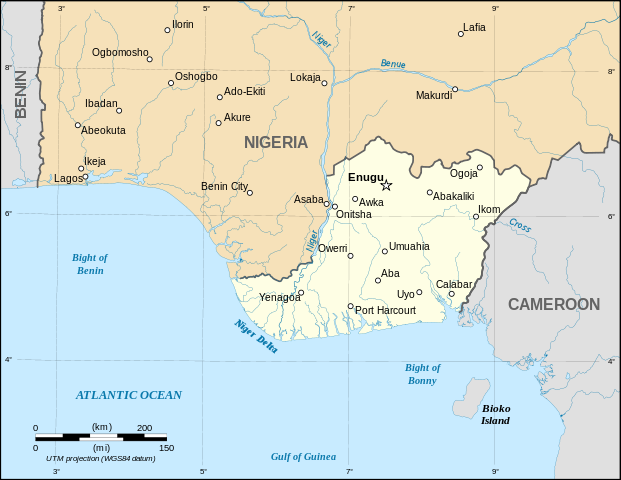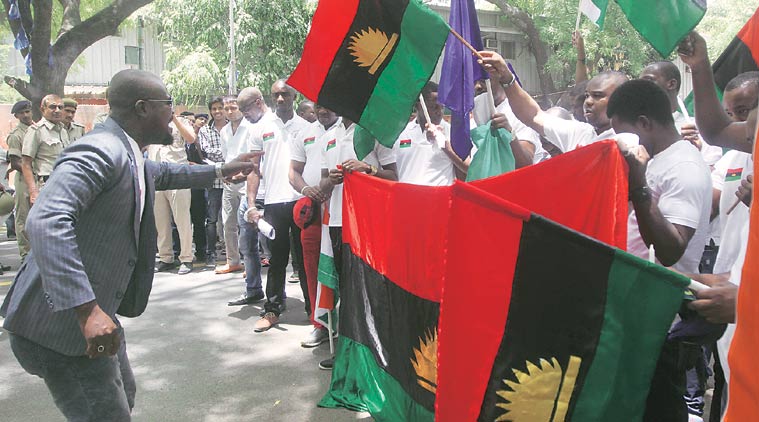 |
| How the World Newspapers reported 2015 Biafra Memorial Day |
Despite the fact that all Nigeria mainstream media bluntly refused to report 2015 Biafra Memorial Day, other high-ranking newspapers across the globe made a hay day out of the Biafran Day.
From the Scotsman in Scotland, The Nation in New York, and The Indian Express in Delhi, Biafra made headline news!
"The Ibos like to think of themselves as the Jews of Africa. They are a hard-working, aggressive people, with a thirst for education and its rewards, a willingness to take any job anywhere if it seems to lead to something better and, perhaps most important and most unusual in Africa, an avid acceptance of new techniques and ideas. Unlike the case in most African tribes, status in traditional Ibo society depended on what a man achieved in his lifetime, not on his inherited titles, caste or wealth. In that kind of achieving society, individuals usually have freedom to try new ways to get ahead and win status. When colonialism came, the Ibos quickly accepted Christian missionaries and their schools, recognizing this new way to achieve status. Over the years, Ibos became the professionals, the foremen, the businessmen and the skilled artisans of Nigeria. This was particularly true in Northern Nigeria, so backward that it had to depend on outsiders—Ibos and Europeans—to run its railroads, its shops, its schools, its offices. Like the Jews of Harlem or the Asians of East Africa or the Chinese of Southeast Asia, the Ibos were the prominent outsiders in the economic life of the dominant population and, like the others, they were hated." -Stanley Meisler
The Nigerian media conspiracy against Biafra can no longer hold it down. Biafra like a Phoenix has risen and never to go down!
On this day: Biafra declared itself independent

In 1967 Biafra declared itself independent of Nigeria in 1967 following a civil war. It was reincorporated three years later. Picture: AFP
1967: Biafra, formerly the province of Eastern Nigeria, changed name and declared itself an independent republic. Ravaged by a war with Nigeria and famine, it was re-incorporated into Nigeria in 1970.
Biafra Heroes Day: Remembering fallen heroes of a country that once was
The civil war, say members of the Biafran community, was actually a genocide that is rarely talked about.
With candles in their hands, a solemn group of nearly 50 men and women gathered at Jantar Mantar on Saturday morning to sing the anthem of a country that no longer exists on the world map. “We shall emerge triumphant from this ordeal,” they said.
These men and women are from Biafra, which had declared its independence from Nigeria on May 30, 1967. They had gathered at Jantar Mantar to mark ‘Heroes’ Day’, to remember those who were killed during the civil war in the country between 1967 and 1970.- See more at:
1967: Biafra Declares its Independence from Nigeria

Photo Credit To Wikipedia Commons/Republic of Biafra in May 1967
Story Highlights
- Historical event
- 30 May 1967
- Biafra had considerable economic power because much of Nigeria's oil resources were located in its area. Nigerian forces blocked humanitarian aid to Biafra, which led to an incredibly large number of victims. It is estimated that more than one million civilians were killed.
On this day in 1967, the Republic of Biafra proclaimed its independence from Nigeria.
The international recognition of Biafra wasn’t achieved, and Nigerian forces eventually defeated it. Biafra was reintegrated into Nigeria.
The area is inhabited by the Igbo people, one of the three most populous ethnic groups of Nigeria (the other two are the Hausa and the Yoruba).
It is interesting to note that the Igbo people are mostly Christians – Roman Catholics. On the contrary, members of the Hausa are mostly Muslims.
Biafra covered an area of about 77,000 square kilometers. It was located in the southeastern part of Nigeria, from the Niger River Delta to the border with Cameroon.
Interestingly, Gabon, Haiti, Ivory Coast, Tanzania and Zambia recognized Biafra as an independent state. Biafra’s independence was also recognized by many other foreign countries, but apparently it was not enough.
The war between Nigerian forces and Biafra broke out. Biafra had considerable economic power because much of Nigeria’s oil resources were located in its area.
Nigerian forces blocked humanitarian aid to Biafra, which led to an incredibly large number of victims.
It is estimated that more than one million civilians were killed. The war ended in 1970, and Biafra rejoined Nigeria.
The Biafran War (or the Nigerian Civil War) became notorious for the starvation of some of the besieged regions, and the consequent genocide of the predominantly Igbo people of the region. Half of them were children.
After the Biafran War, the organization “Doctors Without Borders“ (French: Médecins Sans Frontières) was established as something akin to a reaction to the Biafra’s situation.
May 30, 1967: Biafra Declares Independence From Nigeria
Biafran prisoners sitting near guns captured by Nigeria's federal army in 1967. (AP Photo)
The declaration of Biafran independence set off a three-year civil war in Nigeria, which the breakaway region, dominated by Ibos, lost. The following article by then-frequent Nationcontributor Stanley Meisler (the author, more recently, of a history of the United Nations and a biography of Kofi Annan), “Breakup in Nigeria” (October 9, 1967), described the psychological origins of the Biafran nationalist movement.
Related Stories:
The Ibos like to think of themselves as the Jews of Africa. They are a hard-working, aggressive people, with a thirst for education and its rewards, a willingness to take any job anywhere if it seems to lead to something better and, perhaps most important and most unusual in Africa, an avid acceptance of new techniques and ideas. Unlike the case in most African tribes, status in traditional Ibo society depended on what a man achieved in his lifetime, not on his inherited titles, caste or wealth. In that kind of achieving society, individuals usually have freedom to try new ways to get ahead and win status. When colonialism came, the Ibos quickly accepted Christian missionaries and their schools, recognizing this new way to achieve status. Over the years, Ibos became the professionals, the foremen, the businessmen and the skilled artisans of Nigeria. This was particularly true in Northern Nigeria, so backward that it had to depend on outsiders—Ibos and Europeans—to run its railroads, its shops, its schools, its offices. Like the Jews of Harlem or the Asians of East Africa or the Chinese of Southeast Asia, the Ibos were the prominent outsiders in the economic life of the dominant population and, like the others, they were hated.









No comments:
Post a Comment